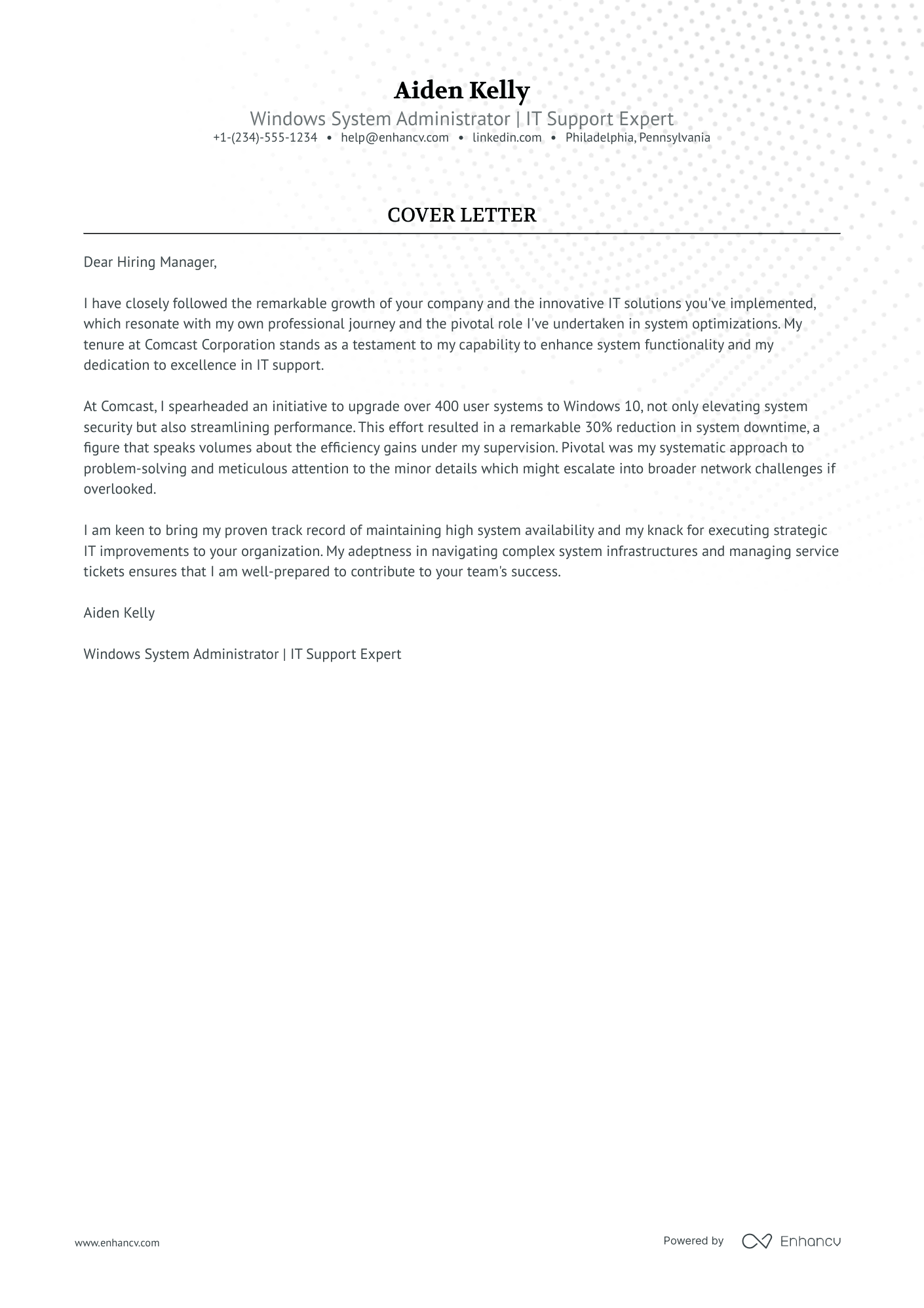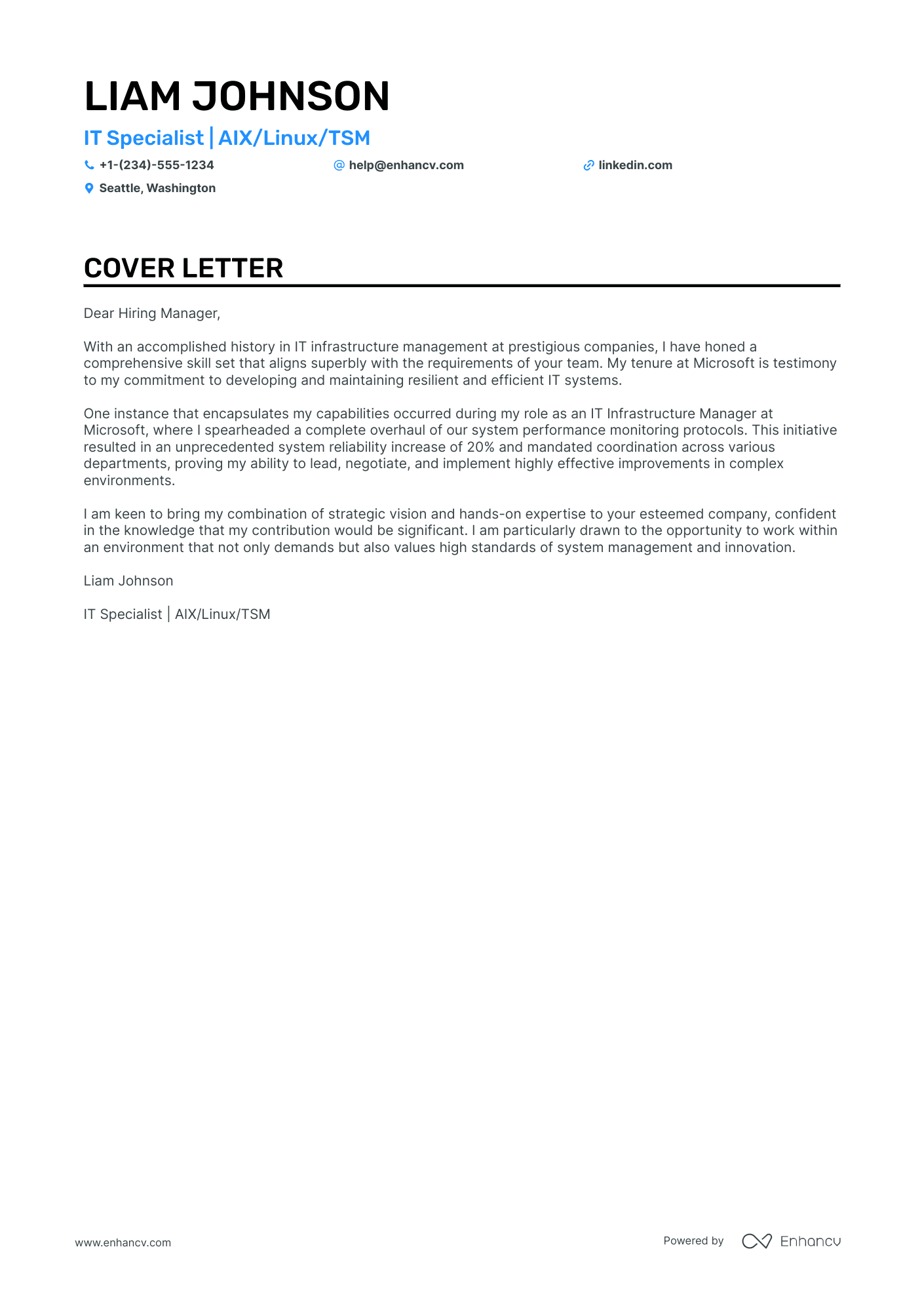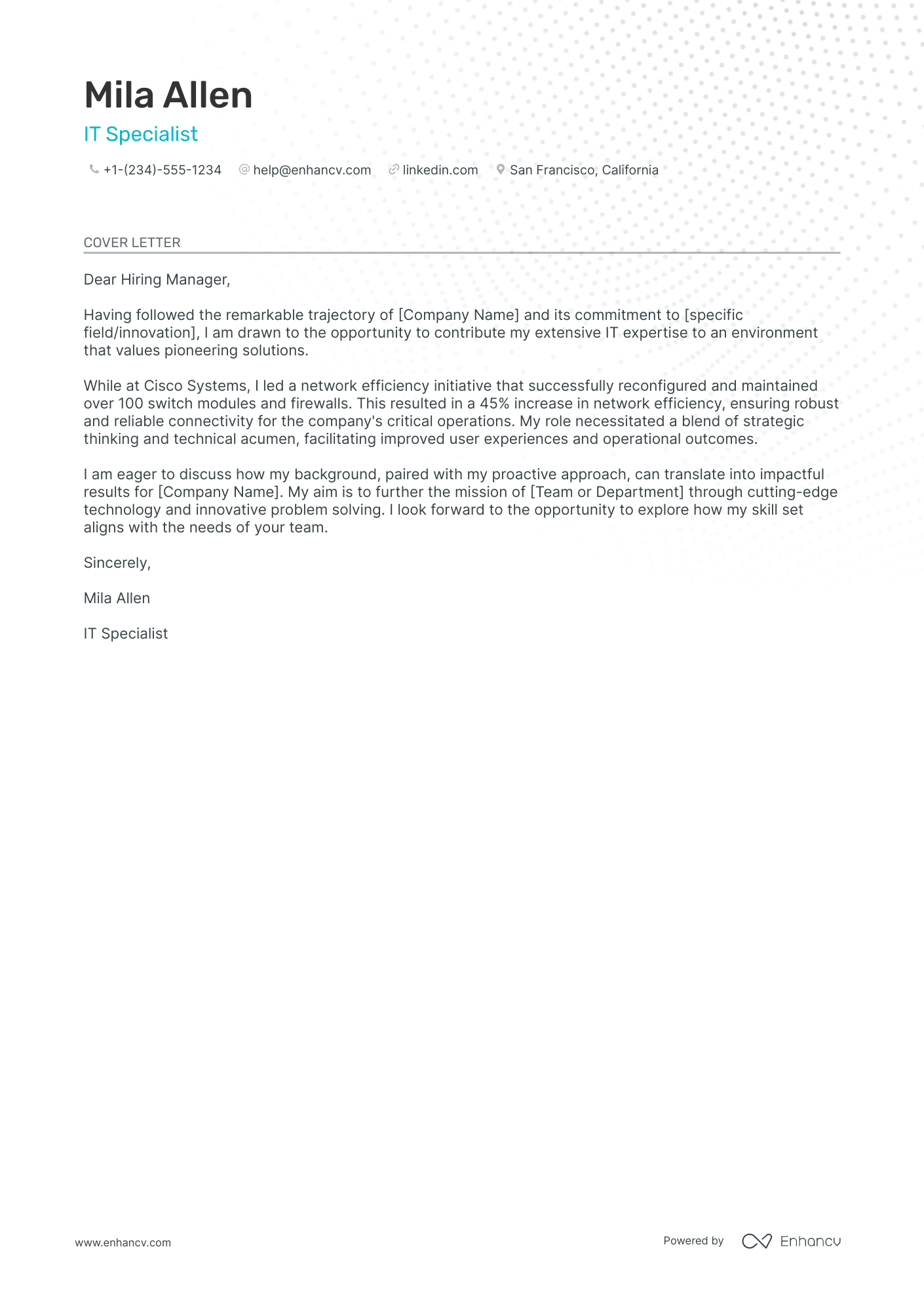Embarking on your job hunt, you've likely discovered that a compelling cover letter can be just as pivotal as your resume—yet, writing one can be daunting. While your resume boasts your career highlights, your system administrator cover letter should weave a narrative around your crowning professional achievement, avoiding the echo of your resume. To engage the reader, forge a formal but unique tone, sidestepping worn-out phrases. Remember, brevity is key: keep it to a single page that packs a punch.
- Write a system administrator cover letter that helps you stand out (and get the job);
- Understand how to start and end your system administrator cover letter with the appropriate greeting;
- What to include in the body of your system administrator cover letter to put your best foot forward;
- Your most important achievements - how to present them as part of your system administrator cover letter.
And if you want to make your life even easier, simply drag and drop your system administrator resume into Enhancv's AI cover letter generator, and it will write your cover letter for you in just a few moments.
If the system administrator isn't exactly the one you're looking for we have a plethora of cover letter examples for jobs like this one:
Drop your resume here or choose a file.
PDF & DOCX only. Max 2MB file size.
System administrator cover letter example
JASMINE BELL
Kansas City, KS
+1-(234)-555-1234
help@enhancv.com
- Emphasizing relevant certifications such as being a Cisco Certified System Administrator demonstrates the candidate's commitment to the field and assures the employer of the candidate's technical proficiency.
- Illustrating the ability to achieve cost savings through strategic projects, like the implementation of a new inventory management system, showcases the candidate's potential for contributing to cost-efficiency and business growth.
- Detailing experience in maintaining network connectivity across multiple branch offices highlights the ability to handle enterprise-level infrastructures and assures reliable network administration capabilities.
- Mentioning the experience in diverse environments such as retail and warehouse settings suggests adaptability and the ability to manage networks in various operational contexts.
The visual appeal of your system administrator cover letter: format, font, and structure
When using our cover letter builder, make sure to include these vital sections:
- Header (with your name, contact details, the role, and date);
- Greeting (that's personalized to the recruiter);
- Introductory paragraph (to capture attention);
- Body paragraph (to tell a story of how you've obtained your job-crucial skills);
- Closing paragraph (ending with a nod to the future ahead);
- Signature (that is not a must).
Our cover letter templates are already set up for you with the best system administrator cover letter design with single-spaced paragraphs and a one-inch margin.
As for the font of your system administrator cover letter, use the same one as you did in your resume (where modern and simple fonts, like Rubik and Bitter, take precedence over Arial and Times New Roman).
Your system administrator cover letter is created with the recruiters in mind - as no Applicant Tracker System looks over this part of your profile.
When sending over your system administrator cover letter, download it in PDF. This format allows your information and design to stay intact and to keep the same visual quality.
Don’t let cover letters slow you down. Use our free cover letter generator to create one in no time.
The top sections on a system administrator cover letter
Header with Contact Information: This section is vital as it provides the recruiter with your name, address, phone number, and email, ensuring they can easily reach out to you for further discussion or to schedule an interview.
Opening Greeting: The greeting sets the tone of your cover letter and should be professionally addressed to the specific hiring manager or department, showing that you've done your research and are serious about the position.
Introduction: In this section, you should succinctly state your intent to apply for the system administrator role and give a brief overview of your relevant experience, capturing the recruiter's interest and encouraging them to read further.
Body of the Letter: Here, you will delve into your specific technical skills, past experiences, and any particular achievements as a system administrator that align with the job description, demonstrating how you can directly benefit their IT infrastructure.
Closing Paragraph & Call to Action: Conclude your cover letter by reiterating your interest in the role, thanking the recruiter for their consideration, and prompting them to initiate the next step, such as an interview, to discuss your application in more detail.
Key qualities recruiters search for in a candidate’s cover letter
- Proven expertise in managing and maintaining servers and network infrastructure, including knowledge of platform-specific systems (e.g., Windows Server, Linux/Unix servers).
- Demonstrated ability to implement and oversee cybersecurity protocols, perform vulnerability assessments, and respond swiftly to security threats to protect organizational data.
- Experience in automation and scripting to streamline repetitive tasks and implement system-wide changes efficiently (e.g., using PowerShell, Bash, Python).
- Strong problem-solving skills evidenced by a track record of quickly diagnosing and resolving complex technical issues involving software, hardware, and networking.
- Familiarity with cloud services and management (such as AWS, Azure, or Google Cloud Platform), including migration, deployment, and administration of cloud-based resources.
- Excellent communication and collaboration abilities to effectively interface with team members, stakeholders, and non-technical personnel, often explaining complex technical concepts in an understandable manner.
The system administrator cover letter salutation: how to address hiring managers
After covering the format of your system administrator cover letter, let's look at the salutation.
Back in the day, the cordial "To whom it may concern" or "Dear Sir/Madam", might have worked out fine.
But, nowadays, your cover letter should approach hiring managers on a more personal basis.
So, what to do about your cover letter salutation?
If you've messaged the recruiters and are on a first name basis or a more formal one, use the hiring manager's name in the greeting (e.g. "Dear Sophie," "Dear Ms. Givens", or "Dear Mr. Everett,").
Always aim to make the effort to find out the name of the hiring manager, who'd be assessing your application. Search on LinkedIn, double-check the advert on the corporate website, or message the brand on social media to find out more about the role.
If you can't find the hiring manager's name (and still want to sound professional), use "Dear HR Team,", "Dear Hiring Manager,", or the likes.
List of salutations you can use
- Dear Hiring Manager,
- Dear [Company Name] Team,
- Dear [Department] Manager,
- Dear Mr./Ms. [Last Name],
- Dear Dr. [Last Name],
- Dear [Job Title] Search Committee,
Your system administrator cover letter intro: showing your interest in the role
On to the actual content of your system administrator cover letter and the introductory paragraph.
The intro should be no more than two sentences long and presents you in the best light possible.
Use your system administrator cover letter introduction to prove exactly what interests you in the role or organization. Is it the:
- Company culture;
- Growth opportunities;
- Projects and awards the team worked on/won in the past year;
- Specific technologies the department uses.
When writing your system administrator cover letter intro, be precise and sound enthusiastic about the role.
Your introduction should hint to recruiters that you're excited about the opportunity and that you possess an array of soft skills, e.g. motivation, determination, work ethic, etc.
Structuring your system administrator cover letter body to add more value
You've hinted at your value as a professional (this may be your passion for the job or interest in the company) in your introduction.
Next, it's time to pan out the body or middle of your system administrator cover letter.
When creating your resume, you've probably gone over the advert a million times to select the most relevant skills.
Well, it's time to repeat this activity. Or just copy and paste your previous list of job-crucial requirements.
Then, select one of your past accomplishments, which is relevant and would impress hiring managers.
Write between three and six paragraphs to focus on the value your professional achievement would bring to your potential, new organization.
Tell a story around your success that ultimately shows off your real value as a professional.
A sincere and original way to end your system administrator cover letter
When writing their system administrator cover letter, candidates tend to use one of these phrases, "Sincerely yours" or "I look forward to hearing from you".
Both statements show good manners, but your cover letter should end in a more actionable manner.
Write about:
- how you see yourself growing in the role/organization;
- the benefits you would bring about (you'd impress even more with tangible metrics);
- the next steps in the process (provide your availability for interviews).
What to write on your system administrator cover letter, when you have zero experience
The best advice for candidates, writing their system administrator cover letters with no experience, is this - be honest.
If you have no past professional roles in your portfolio, focus recruiters' attention on your strengths - like your unique, transferrable skill set (gained as a result of your whole life), backed up by one key achievement.
Or, maybe you dream big and have huge motivation to join the company. Use your system administrator cover letter to describe your career ambition - that one that keeps you up at night, dreaming about your future.
Finally, always ensure you've answered why employers should hire precisely you and how your skills would benefit their organization.
Key takeaways
Creating your system administrator cover letter should be a personalized experience for the role and the recruiter, where you:
- Format your cover letter using the same ATS-friendly font (e.g. Railway) as you did for your resume;
- Greet recruiters, using their name, and follow up with two sentences to introduce yourself, your interest in the role, and to stand out;
- Map out one key success from your career (or life) that has taught you job-crucial skills;
- Substitute your lack of experience with an achievement from your internships, degrees, or volunteering gigs;
- End with a promise for your potential or your availability for an interview.
System Administrator cover letter examples
By Role







